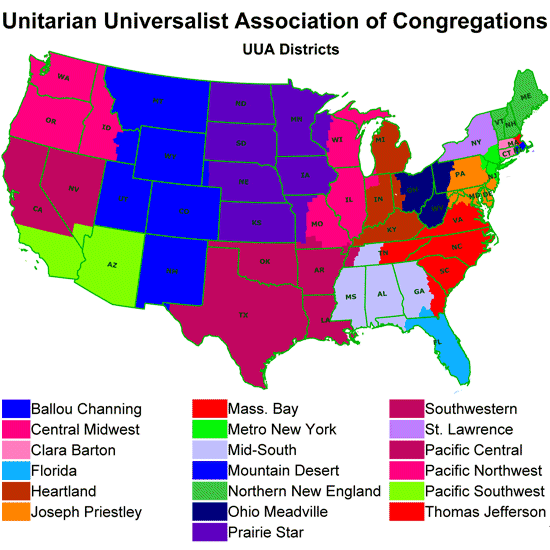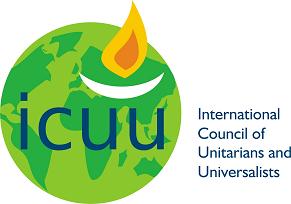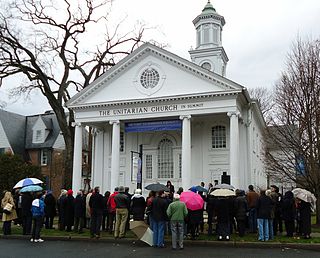This article needs to be updated.(February 2021) |

The Unitarian Universalist Association, an association of Unitarian Universalist Congregations in the United States of America, is composed of 19 Districts.
This article needs to be updated.(February 2021) |

The Unitarian Universalist Association, an association of Unitarian Universalist Congregations in the United States of America, is composed of 19 Districts.
Each District has its own District-level organization, complete with governing body (in the form of an elected council, or board). Districts provide services to their member congregations, including help with ministerial settlement. Each District has a representative on the UUA's Board of Trustees. Collaborations between districts have also resulted in the creation of five unofficial "regions": the Central East Regional Group, the Southern Region, MidAmerica Region, Pacific Western Region and New England Region. Multi-congregational collaboration within districts has also resulted in the creation of unofficial local "clusters" or "networks" (similar to deaneries in episcopal polities) within metropolitan areas with closely approximate churches. Districts also hold annual district assemblies similar to the General Assembly, in which workshops and district business is performed.

The Canadian Unitarian Council (CUC) is a liberal religious association of Unitarian, Universalist, and Unitarian Universalist congregations in Canada. It was formed on May 14, 1961, initially to be the national organization for Canadians belonging to the Unitarian Universalist Association (UUA) which formed a day later on May 15, 1961. Between 1961 and 2002, almost all member congregations of the CUC were also members of the UUA and most services to congregations in Canada were provided by the UUA. However, in 2002, the CUC formally became a separate entity from the UUA, although the UUA continues to provide ministerial settlement services and remains the primary source for education and theological resources. Some Canadian congregations have continued to be members of both the CUC and the UUA, while most congregations are only members of the CUC.

The International Council of Unitarians and Universalists (ICUU) was an umbrella organization founded in 1995 comprising many Unitarian, Universalist, and Unitarian Universalist organizations. It was dissolved in 2021 along with the Unitarian Universalist Partner Church Council to make way for a new merged entity. Some groups represented only a few hundred people; while the largest, the Unitarian Universalist Association, had more than 160,000 members as of May 2011—including over 150,000 in the United States.

Unitarian Universalist Association (UUA) is a liberal religious association of Unitarian Universalist congregations. It was formed in 1961 by the consolidation of the American Unitarian Association and the Universalist Church of America, respectively. However, modern Unitarian Universalists see themselves as a separate religion with its own beliefs and affinities. They define themselves as non-creedal, and draw wisdom from various religions and philosophies, including humanism, pantheism, Christianity, Hinduism, Buddhism, Taoism, Judaism, Islam, and Earth-centered spirituality. Thus, the UUA is a religious group with liberal leanings.

Unitarian Universalism is a liberal religious movement characterized by a "free and responsible search for truth and meaning". Unitarian Universalists assert no creed, but instead are unified by their shared search for spiritual growth. Unitarian Universalists do not have an official, unified corpus of sacred texts. Unitarian Universalist congregations include many atheists, agnostics, deists, and theists; there are churches, fellowships, congregations, and societies around the world.
Flower Communion, also known as Flower Ceremony, Flower Festival, or Flower Celebration, is a ritual service common in Unitarian Universalism, though the specific practices vary between congregations. It is usually held on the last Sunday of worship in late May or June, as some congregations recess from holding services during the summer. Some congregations hold the ceremony earlier in the spring, sometimes coinciding with Mother's Day or Easter.

The Universalist Church of America (UCA) was originally a Christian Universalist religious denomination in the United States. Known from 1866 as the Universalist General Convention, the name was changed to the Universalist Church of America in 1942. In 1961, it consolidated with the American Unitarian Association to form the Unitarian Universalist Association.
The Water Communion is a ritual service common in Unitarian Universalist congregations. It is usually held in the fall, during September, as it is the beginning of the Liturgical year.

The Arlington Street Church is a Unitarian Universalist church across from the Public Garden in Boston, Massachusetts. Because of its geographic prominence and the notable ministers who have served the congregation, the church is considered to be among the most historically important in American Unitarianism and Unitarian Universalism. Completed in 1861, it was designed by Arthur Gilman and Gridley James Fox Bryant to resemble James Gibbs' St. Martin-in-the-Fields in London. The main sanctuary space has 16 large-scale stained-glass windows installed by Tiffany Studios from 1899 to 1930.

Liberal Religious Youth (LRY) was an autonomous, North American youth organization affiliated with the Unitarian Universalist Association (UUA). LRY was unique as a church youth group in that it was governed solely by its members, who were generally between the ages of fourteen and nineteen years old, with adults serving only in an advisory capacity. Though partial funding and office space were provided by the UUA, primary funding was through an independent endowment, the investment of which was controlled by the LRY board of directors.

Unitarian Universalism, as practiced by the Unitarian Universalist Association (UUA), and the Canadian Unitarian Council (CUC), is a non-Creedal and Liberal theological tradition and an LGBTQ affirming denomination.
John A. Buehrens is an American Unitarian Universalist minister and author.
Unitarianism, as a Christian denominational family of churches, was first defined in Poland-Lithuania and Transylvania in the late 16th century. It was then further developed in England and America until the early 19th century, although theological ancestors are to be found as far back as the early days of Christianity. It matured and reached its classical form in the middle 19th century. Later historical development has been diverse in different countries.
Peter Morales is an American former president of the Unitarian Universalist Association. Morales was the UUA's first Latino president. In the early 2000s, he was the senior minister of the Jefferson Unitarian Church in Jefferson County, Colorado, a rapidly growing Unitarian Universalist congregation in the northwestern Denver-Aurora Metropolitan Area. He also worked for the UUA from 2002 to 2004. In 2008, he announced his candidacy for president, and in 2009 he was elected. As the result of a controversy regarding the UUA's hiring practices and charges of institutional racism, Morales resigned as president in 2017, three months before the end of the term.

All Souls Unitarian Church is a Unitarian Universalist (UU) church in Tulsa, Oklahoma. It is one of the largest UU congregations in the world.
First Unitarian Church of Los Angeles is an independent congregation affiliated with the Unitarian Universalist Association of Congregations. Since its founding in 1877 the church has been a leader in social justice activism for the Unitarian Universalist faith, and for the city of Los Angeles. Its embrace of progressive causes and sometimes radical politics have earned it a reputation as both a place of controversy and a beacon of justice. Its affiliated organization, Urban Partners Los Angeles, provides numerous programs in the neighborhood around the church.
The Ohio-Meadville District is a district of the Unitarian Universalist Association. It comprises 46 congregations in most of Ohio, western Pennsylvania, southwestern New York, and West Virginia; 28 are listed as Welcoming Congregations.